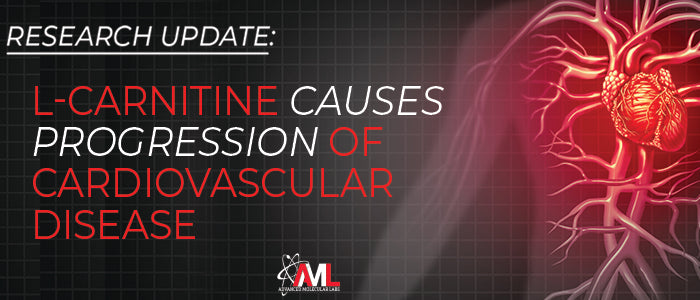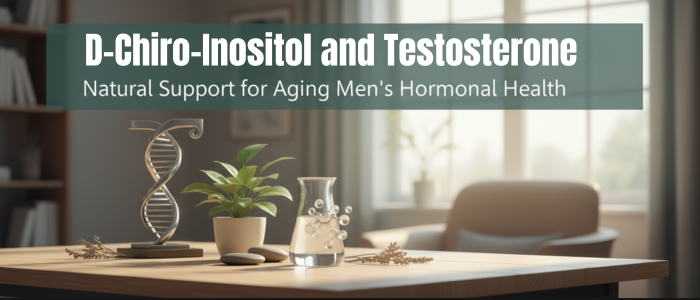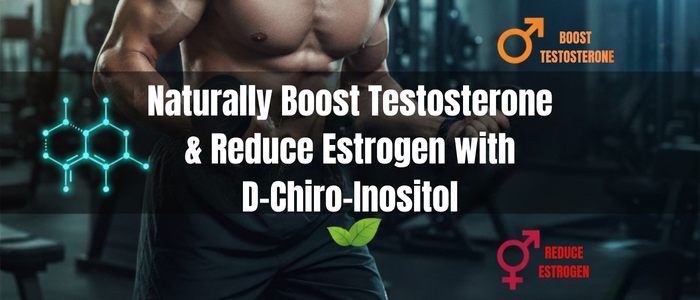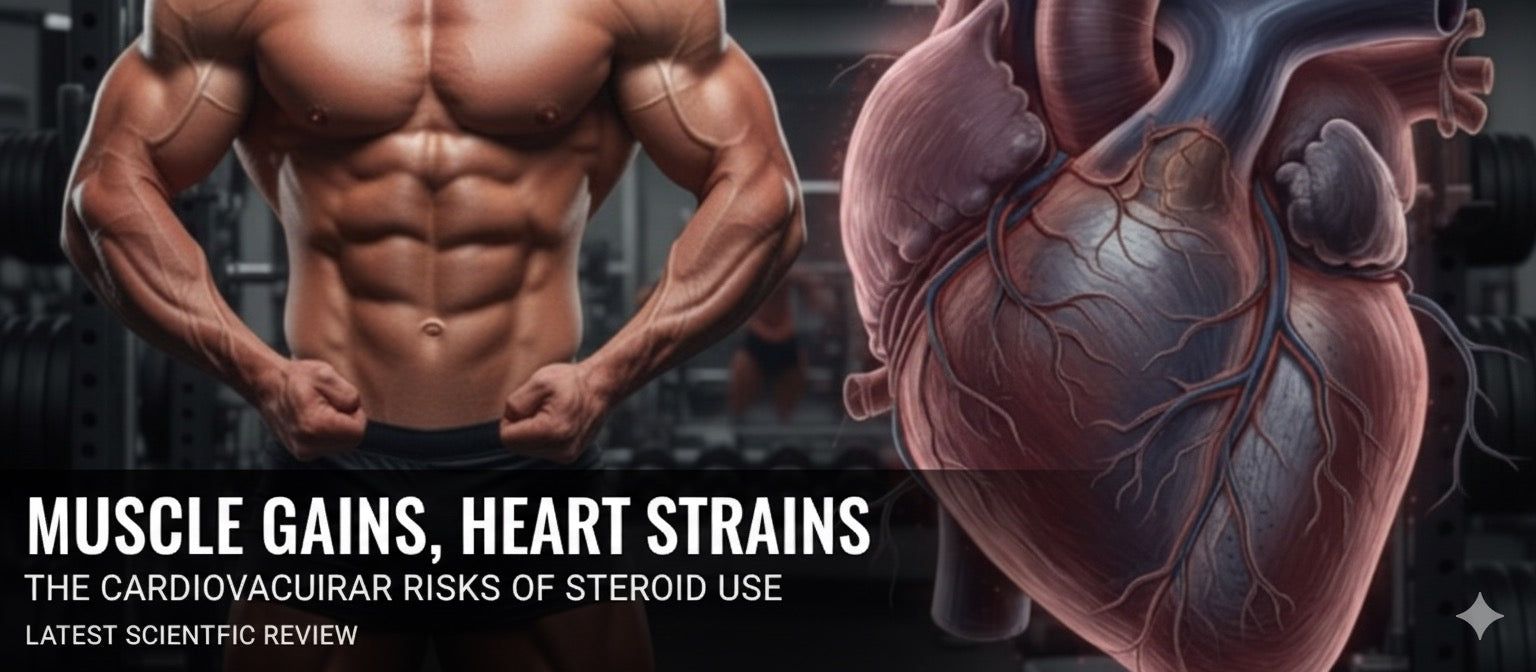


L-Carnitine & Arterial Plaque
By Robert Schinetsky
Atherosclerosis is a chronic inflammatory disease in which there is an accumulation of plaques inside arteries and is the underlying cause of about 50% of all deaths in westernized society.[1]
These plaques are primarily composed of lipids that cause an inflammatory reaction and reduce the diameter of the arteries, causing turbulent flow. In otherwise healthy individuals, blood flow is laminar (“smooth”).
Turbulent flow increases the energy required to drive blood flow because turbulence increases the loss of energy in the form of friction. This leads to an increase in blood pressure (the energy driving blood flow), and over the long term, this can result in atherosclerotic cardiovascular disease (ASCVD).
Additionally, turbulent blood flow is also implicated in the pathogenesis of several other aortic diseases.[2]
Researchers note that atherosclerosis and its pathology can be prevented through a mixture of regular exercise, eating a healthy diet low in saturated and trans fat (such as the Mediterranean diet), maintaining a healthy body weight and avoiding smoking.[1]
In addition to the above measures to support cardiovascular health, many individuals also utilize dietary supplements. One particular supplement that has been used and studied rather extensively is L-Carnitine, which has been linked to the formation of arterial plaque.
What is L-Carnitine?
Carnitine is an essential nutrient involved in lipid metabolism as it helps shuttle fatty acids into the cell where they can then be oxidized (“burned”) for energy.
Previous clinical studies using L-Carnitine supplementation have noted improvements in some cardiovascular risk factors (such as LDL, total cholesterol, and blood pressure).[3,4,5,8] Supplementation with L-Carnitine has also been found to improve feelings of hunger and fatigue induced by fasting in individuals with metabolic syndrome.[6]
And, a 2020 systematic review and meta-analysis of 37 randomized controlled clinical trials found that:
“l-carnitine supplementation provides a modest reducing effect on body weight, BMI and fat mass, especially among adults with overweight/obesity.”[7]
It should be noted, though, that a previous 2014 meta-analysis found no benefit from L-carnitine supplementation in patients with cardiovascular disease.[14]

Carnitine, Heart Disease & TMAO
To further muddy the waters, other research notes an association between carnitine intake and increased plasma levels of pro-atherogenic trimethylamine N-oxide (TMAO).[9,10,16] TMAO has been identified as a risk factor for cardiovascular diseases and reported to be elevated in several cardiovascular events as well as type 2 diabetes.
TMAO can be ingested directly from TMAO-containing foods, such as seafood or fish[11], and it can be generated from the oxidation of TMA that occurs in the gut microbiota. TMA is generated in the gut from carnitine, GBB, betaine, and choline-containing compounds.
Approximately 50% of ingested TMAO is absorbed unchanged and then excreted in urine. The remaining 50% is converted into TMA in the gut by the action of the enzyme, TMAO reductase.[12]
Given the conflicting data, researchers have delved deeper into the L-Carnitine--TMAO connection and found that it is highly variable.[13] More specifically, the composition of an individual’s gut microbiome can impact whether they are a “low-TMAO producer” or a “high-TMAO producer.” Researchers found that “low” TMAO producers demonstrated higher urine carnitine levels than “high” TMAO producers following 1,500mg of carnitine supplementation, thereby suggesting that the TMAO-producing status could influence carnitine bioavailability.[13]
With this in mind, a new study crossed the science wire recently regarding the impact of carnitine supplementation on cardiovascular-related factors.
New L-Carnitine Research
Published in the respected Nutrition & Metabolism journal, a phase 2, prospective, double-blinded, randomized, placebo-controlled trial investigated the progression or regression of carotid total plaque volume (TPV) in participants with metabolic syndrome.[15]
157 individuals took part in the six-month study, with 76 participants receiving 2,000mg/day of oral L-Carnitine and 81 participants receiving placebo (cellulose).
At the conclusion of the study, researchers found no difference in TPV change between the groups. However, the L-Carnitine group had a greater increase in carotid atherosclerotic stenosis of 9.3% (p = 0.02) compared to the placebo group.[15]
Important Takeaway
Researchers noted that while there was not a significant increase in total plaque volume following six months of L-carnitine supplementation, their findings suggest potential harm with L-Carnitine supplements, both for worsening cardiometabolic risk factors (i.e., LDL-C) and for atherosclerosis progression (i.e., stenosis), potentially contributing to arterial plaque.
As such, they caution the use of L-carnitine supplements, especially for individuals at high cardiovascular risk, such as those with metabolic syndrome.
The Plot Thickens…
Interestingly, the researchers found that the adverse effect of L-Carnitine was greater in participants with low meat consumption than in those with high meat consumption.
This flies in the face of other research that has suggested a possible mechanism linking red meat consumption to heart disease.[18,19]
In May 2022, research published in the Journal of the American Medical Association found that TMAO levels in older adults were positively associated with a higher risk of death whether deaths were related to cardiovascular disease or another disease.[18] In fact, individuals in the study with the highest levels of plasma TMAO had a 20-30% higher risk of death compared with those having the lowest levels.
A newly published study in Arteriosclerosis, Thrombosis, and Vascular Biology, including 3,931 men and women over age 65, noted that higher meat consumption was linked to a higher risk of atherosclerotic cardiovascular disease (ASCVD). More specifically, researchers noted a 22% higher risk of ASCVD for about every 1.1 servings per day.[19]
Average age of participants at the beginning of the study was 73 years old, and they were followed for an average of 12.5 years. Individuals self-reported their diet, which is known to be less-than-accurate.
Some other key findings from the study are:
- The increased risk of ASCVD was partly mediated by plasma levels of TMAO, gamma-butyrobetaine (GBB) and crotonobetaine (a proatherogenic gut microbiome metabolite of L-Carnitine)[20]
- Insulin levels and blood glucose as well as systemic inflammation also contributed to the higher risk of ASCVD associated with meat intake
- Blood pressure nor blood cholesterol levels were identified as contributors to the increased risk of ASCVD associated with meat intake
- Intakes of fish, poultry, and eggs were not significantly associated with ASCVD. (This is particularly interesting given that seafood has high levels of TMAO and eggs contain choline and cholesterol).

While the researchers adjusted for many risk factors, including age, sex, race/ethnicity, smoking, and physical activity, there is not explicit statement in regards to the individuals body fat percentage or body mass index (BMI) and its correlation to increased risk of ASCVD. It has been known for some time that being overweight or obese shortens lifespan and increases risk of CVD.[21]
Takeaway
The latest round of research concerning carnitine supplementation, meat intake, and potential increased risk of cardiovascular disease, including the formation of arterial plaque, is intriguing.
Carnitine (like choline) is essential for the body to function, and it can be obtained from foods common to the diet.
The question, then, is are supplemental forms of carnitine, choline, etc. a viable/healthy/safe option for those who are already getting enough of these essential nutrients from their diet.
To be honest, the research is conflicted. Some studies find benefit to carnitine supplementation, while others find no significant benefit. Still other studies find that it may actually be detrimental to long-term cardiovascular health.
The same can be said of red meat intake. There’s research on both sides of the fence showing red meat is beneficial and it’s associated with increased CVD risk.
As we mentioned earlier, nutrition is highly individualized. Genetics, gut microbiome composition, and a host of lifestyle factors all impact an individual’s risk for CVD.
With that in mind, remember that the choices you make day in and day out have tremendous impact on your health and longevity.
- Exercise regularly
- Eat a healthy diet
- Maintain a healthy body composition
- Manage stress
- Get enough sleep each night
- Limit alcohol intake
- Avoid smoking
- Supplement when appropriate
Advanced Molecular Labs does NOT include L-Carnitine in its dietary supplements for the reasons outlined above, as well as the ones we’ve previously covered. We suggest the Mediterranean Diet, which is naturally rich in heart-healthy fats, fiber, whole grains, protein, fruits, vegetables, antioxidants and polyphenols. Moreover, the Mediterranean Diet continues to rank as the best overall diet for healthy eating and ease of compliance.
©Published by Advanced Research Media, Inc. 2022
©Reprinted with permission from Advanced Research Media, Inc.
References
- Pahwa R, Jialal I. Atherosclerosis. [Updated 2022 Jun 19]. In: StatPearls [Internet]. Treasure Island (FL): StatPearls Publishing; 2022 Jan-. Available from: https://www.ncbi.nlm.nih.gov/books/NBK507799/
- Ha H, Ziegler M, Welander M, Bjarnegård N, Carlhäll CJ, Lindenberger M, Länne T, Ebbers T, Dyverfeldt P. Age-Related Vascular Changes Affect Turbulence in Aortic Blood Flow. Front Physiol. 2018 Jan 25;9:36. doi: 10.3389/fphys.2018.00036. PMID: 29422871; PMCID: PMC5788974.
- Malaguarnera M, Vacante M, Motta M, Malaguarnera M, Li Volti G, Galvano F. Effect of L-carnitine on the size of low-density lipoprotein particles in type 2 diabetes mellitus patients treated with simvastatin. Metabolism. 2009;58:1618–1623. doi: 10.1016/j.metabol.2009.05.014.
- Mykkanen L, Kuusisto J, Haffner SM, Laakso M, Austin MA. LDL size and risk of coronary heart disease in elderly men and women. Arterioscler Thromb Vasc Biol. 1999;19:2742–2748. doi: 10.1161/01.atv.19.11.2742.
- Askarpour M, Hadi A, Dehghani Kari Bozorg A, Sadeghi O, Sheikhi A, Kazemi M, Ghaedi E. Effects of L-carnitine supplementation on blood pressure: a systematic review and meta-analysis of randomized controlled trials. J Hum Hypertens. 2019;33:725–734. doi: 10.1038/s41371-019-0248-1
- Zhang JJ, Wu ZB, Cai YJ, Ke B, Huang YJ, Qiu CP, Yang YB, Shi LY, Qin J. L-carnitine ameliorated fasting-induced fatigue, hunger, and metabolic abnormalities in patients with metabolic syndrome: a randomized controlled study. Nutr J. 2014 Nov 26;13:110. doi: 10.1186/1475-2891-13-110. PMID: 25424121; PMCID: PMC4258024.
- Talenezhad N, Mohammadi M, Ramezani-Jolfaie N, Mozaffari-Khosravi H, Salehi-Abargouei A. Effects of l-carnitine supplementation on weight loss and body composition: A systematic review and meta-analysis of 37 randomized controlled clinical trials with dose-response analysis. Clin Nutr ESPEN. 2020 Jun;37:9-23. doi: 10.1016/j.clnesp.2020.03.008. Epub 2020 Apr 18. PMID: 32359762.
- Asadi M, Rahimlou M, Shishehbor F, Mansoori A. The effect of l-carnitine supplementation on lipid profile and glycaemic control in adults with cardiovascular risk factors: A systematic review and meta-analysis of randomized controlled clinical trials. Clin Nutr. 2020 Jan;39(1):110-122. doi: 10.1016/j.clnu.2019.01.020. Epub 2019 Feb 22. PMID: 30850271.
- Gao, X., Tian, Y., Randell, E., Zhou, H., & Sun, G. (2019). Unfavorable Associations Between Serum Trimethylamine N-Oxide and L-Carnitine Levels With Components of Metabolic Syndrome in the Newfoundland Population . In Frontiers in Endocrinology (Vol. 10). https://www.frontiersin.org/articles/10.3389/fendo.2019.00168
- Vallance HD, Koochin A, Branov J, Rosen-Heath A, Bosdet T, Wang Z, Hazen SL, Horvath G. Marked elevation in plasma trimethylamine-N-oxide (TMAO) in patients with mitochondrial disorders treated with oral l-carnitine. Mol Genet Metab Rep. 2018 May 3;15:130-133. doi: 10.1016/j.ymgmr.2018.04.005. PMID: 30023305; PMCID: PMC6047224.
- Zhang AQ, Mitchell SC, Smith RL. Dietary precursors of trimethylamine in man: a pilot study. Food Chem Toxicol. 1999 May;37(5):515-20. doi: 10.1016/s0278-6915(99)00028-9. PMID: 10456680.
- Fennema D., Phillips I.R., Shephard E.A. Trimethylamine and Trimethylamine N-Oxide, a Flavin-Containing Monooxygenase 3 (FMO3)-Mediated Host-Microbiome Metabolic Axis Implicated in Health and Disease. Drug Metab. Dispos. 2016;44:1839–1850. doi: 10.1124/dmd.116.070615.
- Wu, WK., Panyod, S., Liu, PY. et al. Characterization of TMAO productivity from carnitine challenge facilitates personalized nutrition and microbiome signatures discovery. Microbiome 8, 162 (2020). https://doi.org/10.1186/s40168-020-00912-y
- Shang R, Sun Z, Li H. Effective dosing of L-carnitine in the secondary prevention of cardiovascular disease: a systematic review and meta-analysis. BMC Cardiovasc Disord. 2014;14:88.
- Johri AM, Hétu MF, Heyland DK, Herr JE, Korol J, Froese S, Norman PA, Day AG, Matangi MF, Michos ED, LaHaye SA, Saunders FW, Spence JD. Progression of atherosclerosis with carnitine supplementation: a randomized controlled trial in the metabolic syndrome. Nutr Metab (Lond). 2022 Apr 2;19(1):26. doi: 10.1186/s12986-022-00661-9. PMID: 35366920; PMCID: PMC8976995.
- Samulak JJ, Sawicka AK, Samborowska E, Olek RA. Plasma Trimethylamine-N-oxide following cessation of lcarnitine supplementation in healthy aged women. Nutrients. 2019;11. 10.3390/nu11061322.
- Koeth RA, Wang Z, Levison BS, Buffa JA, Org E, Sheehy BT, Britt EB, Fu X, Wu Y, Li L, Smith JD, DiDonato JA, Chen J, Li H, Wu GD, Lewis JD, Warrier M, Brown JM, Krauss RM, Tang WH, Bushman FD, Lusis AJ, Hazen SL. Intestinal microbiota metabolism of L-carnitine, a nutrient in red meat, promotes atherosclerosis. Nat Med. 2013 May;19(5):576-85. doi: 10.1038/nm.3145. Epub 2013 Apr 7. PMID: 23563705; PMCID: PMC3650111.
- Fretts AM, Hazen SL, Jensen P, et al. Association of Trimethylamine N-Oxide and Metabolites With Mortality in Older Adults. JAMA Netw Open. 2022;5(5):e2213242. doi:10.1001/jamanetworkopen.2022.13242
- Dietary Meat, Trimethylamine N-Oxide-Related Metabolites, and Incident Cardiovascular Disease Among Older Adults: The Cardiovascular Health Study, Arteriosclerosis Thrombosis and Vascular Biology (2022). DOI: 10.1161/ATVBAHA.121.316533
- Koeth R, Culley M, Wang Z, et al. CROTONOBETAINE IS A PROATHEROGENIC GUT MICROBIOTA METABOLITE OF L-CARNITINE. J Am Coll Cardiol. 2019 Mar, 73 (9_Supplement_1) 14. https://doi.org/10.1016/S0735-1097(19)30623-0
- Khan SS, Ning H, Wilkins JT, et al. Association of Body Mass Index With Lifetime Risk of Cardiovascular Disease and Compression of Morbidity. JAMA Cardiol. 2018;3(4):280– doi:10.1001/jamacardio.2018.0022




